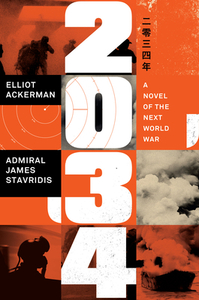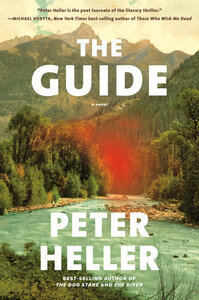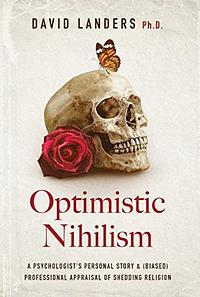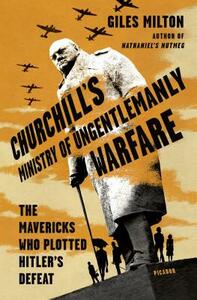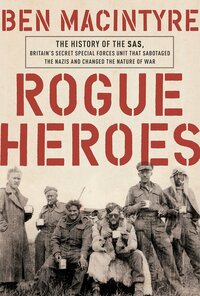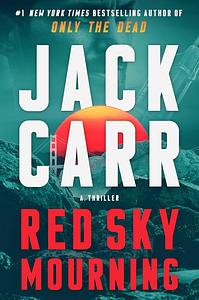You need to sign in or sign up before continuing.
Take a photo of a barcode or cover
the_grimm_reader's Reviews (242)
This was an entertaining read, at least as entertaining as the subject of a potential world war can be. I’ve read other reviews that really dig deep into complaints about the likelihood of these scenarios actually playing out. In post, I don’t find I have the same criticisms. It is a work of fiction in the thriller genre, so I just accepted the world and cast of characters as the ground on which the scenarios played out. What I actually found refreshing was the multicultural and geopolitical ensemble—there isn’t one “hero” or “villain” to follow in this work. The entire imagining of dominos that fall and pave the way into and through World War III, as in reality, are pushed over by many people across the globe at various levels of government. If the writers bent reality a bit to make way for certain events to occur, that seemed reasonable enough to me. It’s not a history book, so if you’re looking for historical fiction this isn’t it.
Last year, I stopped by a small bookshop in Winter Park, Colorado, and picked up Heller's "The Last Ranger." The cover struck me, and the synopsis plucked my high interest in nature and National Parks. The park Ranger protagonist seemed like a fellow I'd like to know. It was a fantastic read, so I thought I'd try "The Guide," and I'm so glad I did.
I consumed this book in a couple of days. Like "The Ranger," Heller's language is soaked with a deep reverence for natural spaces. He can pull you into the scenes, soothingly describing colors and sounds—you can almost taste and smell the words. Further, his use of nature to convey human feelings and emotions firms the bond between humanity and the natural world (which seems silly to say, as we are natural creatures).
What I simply love about "The Guide" (like "The Ranger") is the layers of mystery and the cascading threat that lurks in these pristine spaces. Heller has a gift for holding your hand and taking you on a nature walk, then quickly tossing you into circumstances and high-anxiety situations through the characters.
Perhaps it is because of my love of the outdoors, but I easily relate to the protagonist, Jack, from The Guide. He is believable and exciting, and like many, he has hidden (and dangerous) facets of himself that he works to keep hidden and in check. When those subdued factors emerge, Heller describes the feelings in unique ways that I think I'll find helpful in my life.
I typically do not like romance in movies or books, especially if they feel forced. Still, the underlying thread of human attraction and relationship in "The Guide" was quite comforting and exciting. Perhaps it is because I am twice Jack's age, but I enjoyed the lovely fireflies that scoot and glow between our flawed hero and another character. I cannot say that it was unexpected, but it still smacked of the best types of attraction (in my opinion), built on intellectual, emotional, and physical parts all in balance.
Like any good thriller, the mysteries and curiosities in "The Guide" eventually pop off, and all the little spores Heller scattered along the way begin to irritate all of the characters in the play into a nail-biting final act.
Apparently, the primary protagonist in "The Guide" was also the main character in another of Heller's works, "The River." I did not know this at the time of reading, and other reviewers have stated that one does not need to read "The River" first, so I plan to read it shortly. I have read that it provides context to many of the drivers and triggers that Jack eludes to in "The Guide." I'm sure it will be an excellent "prequel" experience and provide more texture to Jack, who I think is a down-to-earth, believable character.
I consumed this book in a couple of days. Like "The Ranger," Heller's language is soaked with a deep reverence for natural spaces. He can pull you into the scenes, soothingly describing colors and sounds—you can almost taste and smell the words. Further, his use of nature to convey human feelings and emotions firms the bond between humanity and the natural world (which seems silly to say, as we are natural creatures).
What I simply love about "The Guide" (like "The Ranger") is the layers of mystery and the cascading threat that lurks in these pristine spaces. Heller has a gift for holding your hand and taking you on a nature walk, then quickly tossing you into circumstances and high-anxiety situations through the characters.
Perhaps it is because of my love of the outdoors, but I easily relate to the protagonist, Jack, from The Guide. He is believable and exciting, and like many, he has hidden (and dangerous) facets of himself that he works to keep hidden and in check. When those subdued factors emerge, Heller describes the feelings in unique ways that I think I'll find helpful in my life.
I typically do not like romance in movies or books, especially if they feel forced. Still, the underlying thread of human attraction and relationship in "The Guide" was quite comforting and exciting. Perhaps it is because I am twice Jack's age, but I enjoyed the lovely fireflies that scoot and glow between our flawed hero and another character. I cannot say that it was unexpected, but it still smacked of the best types of attraction (in my opinion), built on intellectual, emotional, and physical parts all in balance.
Like any good thriller, the mysteries and curiosities in "The Guide" eventually pop off, and all the little spores Heller scattered along the way begin to irritate all of the characters in the play into a nail-biting final act.
Apparently, the primary protagonist in "The Guide" was also the main character in another of Heller's works, "The River." I did not know this at the time of reading, and other reviewers have stated that one does not need to read "The River" first, so I plan to read it shortly. I have read that it provides context to many of the drivers and triggers that Jack eludes to in "The Guide." I'm sure it will be an excellent "prequel" experience and provide more texture to Jack, who I think is a down-to-earth, believable character.
I typically populate most of my reading lineup with finds from the discounted section at our local book store. I’m enjoy apocalypse fiction, but I’ve always shied away from anything zombie related. Full disclosure; it was the title and cover that caught my eye. I thumbed to and read few random pages (I prefer this method often, rather than reading the synopsis—if I’m drawn in with little context, I’ll give the book a try—I’ve found some unexpected gems this way).
So, this book is about zombies, in large part, but they’re called “skrakes” (a world I’ll likely recall and use). I would say that while the skrakes are a definite threat and certainly the cause for some type of permanent collapse, they are by-and-large only background elements that set the palette for the character portrait of a young girl (teen-woman?) named “Orpen.” We follow this young, seemingly well-trained, survivor along the roads of Ireland as she seeks answer to her many questions in a place called “Phoenix City.”
I enjoyed the way the author told this story, taking us back through leap-frogging first-person recollections, through Orpen’s early childhood, training, and upbringing, all the while bringing us back to the present and unfolding stages of her journey through Ireland (using the same leap-frogging chapters device).
I was left with a lot of questions at this book’s close, which leads me to think I’d like read further takes of this world and its characters should the author find success (and motivation) to write another book set in this environment—the setup is certainly there. I’d be happy to take take another trip to her vision of post-apocalyptic Ireland, the land of “skrakes.”
So, this book is about zombies, in large part, but they’re called “skrakes” (a world I’ll likely recall and use). I would say that while the skrakes are a definite threat and certainly the cause for some type of permanent collapse, they are by-and-large only background elements that set the palette for the character portrait of a young girl (teen-woman?) named “Orpen.” We follow this young, seemingly well-trained, survivor along the roads of Ireland as she seeks answer to her many questions in a place called “Phoenix City.”
I enjoyed the way the author told this story, taking us back through leap-frogging first-person recollections, through Orpen’s early childhood, training, and upbringing, all the while bringing us back to the present and unfolding stages of her journey through Ireland (using the same leap-frogging chapters device).
I was left with a lot of questions at this book’s close, which leads me to think I’d like read further takes of this world and its characters should the author find success (and motivation) to write another book set in this environment—the setup is certainly there. I’d be happy to take take another trip to her vision of post-apocalyptic Ireland, the land of “skrakes.”
When I was a child in the '80s, I watched a TV movie called "The Day After." It was a made-for-tv movie on ABC about a nuclear strike on the United States and the days following. By today's standards, the production quality would be considered poor, but at the time, and as a young child, I watched with eyes open in horror. Just as "Jaws" had demonized and planted a terror in many for what was unseen beneath the waves, "The Day After" had seeded a deep sorrow and fear in my young mind. "Could this happen?" I wondered. Little did I know, but it had happened, in Hiroshima and Nagasaki in 1945, and it was the United States that had unleashed the dread.
I picked up this book—"Fallout"—at a local bookstore in the discount section, and I am glad I did. It is a beautiful piece of journalism about a piece of reporting that became one of the most terrifying and bleak days in human history. Focused entirely on "The New Yorker" journalist John Hersey, this work provides texture to the politics and powers at play leading up to August 6th, 1945, the cloak-and-dagger methods employed by "The New Yorker" team in support of John Hersey's deeply personal interviews with Hiroshima survivors (victims), on to the immediate impact of the "Hiroshima" article in "The New Yorker," and it's continued place in the history of the world.
John Hersey's article was published as a book (which I have ordered). This book, "Fallout," has encouraged me to read it—it feels essential.
Leslie Blume's "Fallout" did nothing to soothe my childhood fears; if anything, my old, blunt, ignorant fears have a sharper edge to them—the threat is more acute than I understood as a boy. Unfortunately, the same sorts of human political madness that brought these nightmarish events to bear are at play in 2024. This work did not restore my faith in humanity. Yet, in Blume's portraits of Hersey, I found something powerful: the human ability to look deeply into the oiliest, blackened follies of mankind and still persevere in doing a good thing.
The odds were against John Hersey and "The New Yorker" as they endeavored to produce a truly human view of what happened at Hiroshima. They faced financial ruin, nationalist venom, and all the powers and tactics of the 1945 World War II United States government propaganda engine. Blume's work drives deep into me the great value and vanguard of a genuinely free press as an on-the-ground guerilla force in the effort to diminish the continuing drums of for-profit war hawks and those with ego-driven, tyrannical aspirations wrapped up in the flag of democracy.
I highly recommend this work—do not look away.
I picked up this book—"Fallout"—at a local bookstore in the discount section, and I am glad I did. It is a beautiful piece of journalism about a piece of reporting that became one of the most terrifying and bleak days in human history. Focused entirely on "The New Yorker" journalist John Hersey, this work provides texture to the politics and powers at play leading up to August 6th, 1945, the cloak-and-dagger methods employed by "The New Yorker" team in support of John Hersey's deeply personal interviews with Hiroshima survivors (victims), on to the immediate impact of the "Hiroshima" article in "The New Yorker," and it's continued place in the history of the world.
John Hersey's article was published as a book (which I have ordered). This book, "Fallout," has encouraged me to read it—it feels essential.
Leslie Blume's "Fallout" did nothing to soothe my childhood fears; if anything, my old, blunt, ignorant fears have a sharper edge to them—the threat is more acute than I understood as a boy. Unfortunately, the same sorts of human political madness that brought these nightmarish events to bear are at play in 2024. This work did not restore my faith in humanity. Yet, in Blume's portraits of Hersey, I found something powerful: the human ability to look deeply into the oiliest, blackened follies of mankind and still persevere in doing a good thing.
The odds were against John Hersey and "The New Yorker" as they endeavored to produce a truly human view of what happened at Hiroshima. They faced financial ruin, nationalist venom, and all the powers and tactics of the 1945 World War II United States government propaganda engine. Blume's work drives deep into me the great value and vanguard of a genuinely free press as an on-the-ground guerilla force in the effort to diminish the continuing drums of for-profit war hawks and those with ego-driven, tyrannical aspirations wrapped up in the flag of democracy.
I highly recommend this work—do not look away.
I got a lot out of this book; it covers a lot of ground in roughly 300 pages—some of those pages were hard to read, but at least they were raw and true. If you’re looking for a dose of reality without the fluff and frosting, then you can do worse than this book.
My favorite place to discover new gems is the discount section of our local bookstore. The cover of Seven Crows caught my eye, and the synopsis reeled me in. I thumbed to a few random pages to sample. The violence was sticky with blood, the language was vicious and mean, and this character—"Killy" Delaney—brought both by the boxcar like a runaway train. I wanted to read more, so I added this read to my stack.
This book is about revenge but also love, making tough choices in an even tougher world, and a reminder that not everyone gets an easy ride. Killian is flawed, and sometimes I wanted to tell her to cool out, but then I'd hang on, walk into the fray alongside her, hand clenching the brass knuckles in her clenched fist as she made a mess of the bad guys.
This book has plenty of bad guys, and they are precisely the type of punchable trash you love to hate in a book like this. After a while, I was counting the pages to find out what kind of bone-breaking bashing "Kill" would bring to them.
Young love, prison, street fighting, bikers, sex, friendship, secret organizations, and family—Kessler's characters cover a lot of ground in 350+ pages. It's an exciting page-turner with interesting leads and savory breadcrumbs for the following books in the Killian Delaney series—I'm on the hook for more.
If you're into high-action badassery where the bad guys get stomped, the good guys aren't invincible, and the world isn't bright and sunny, Seven Crows may be a read for you.
This book is about revenge but also love, making tough choices in an even tougher world, and a reminder that not everyone gets an easy ride. Killian is flawed, and sometimes I wanted to tell her to cool out, but then I'd hang on, walk into the fray alongside her, hand clenching the brass knuckles in her clenched fist as she made a mess of the bad guys.
This book has plenty of bad guys, and they are precisely the type of punchable trash you love to hate in a book like this. After a while, I was counting the pages to find out what kind of bone-breaking bashing "Kill" would bring to them.
Young love, prison, street fighting, bikers, sex, friendship, secret organizations, and family—Kessler's characters cover a lot of ground in 350+ pages. It's an exciting page-turner with interesting leads and savory breadcrumbs for the following books in the Killian Delaney series—I'm on the hook for more.
If you're into high-action badassery where the bad guys get stomped, the good guys aren't invincible, and the world isn't bright and sunny, Seven Crows may be a read for you.
This book earned its 5 stars, and I’d give it more if I could. It’s an absolutely thorough history of the British Special Air Service’s origins and early history, written with a style and tempo that paints each actor in these theaters of World War II in bold, sweeping strokes, and meticulous detail. We meet the men as they were, all of their pre-existing baggage included, and follow them on into and through the final days of the war. This is the highly engaging, interesting, and often tragic Chapter 1 for every special operations unit since. Cheers to these “desert rats,” and their service to their brothers and their daring endeavors to crush the wave of Nazism and Fascism. “Who Dares Wins.”
I have been reading the James Reece series from the jump, and I also really enjoyed the Amazon Prime iteration of the character from “The Terminal List” (book 1). I used to listen to the Danger Close podcast by Jack Carr (George Peterson) regularly. I’ve purchased Jack Carr merch. I’d say that I had become a fan. That said, I think this will be my last James Reece read, and without giving too much away, I think the timing is right to jump off. While I’ve really enjoyed the series, there have been some gripes for me from the jump. The over abundance of descriptions and product placement interfere with the flow of the story; it got to be too much for me. I understand that details matter and can add context, but often it seems heavy handed. Perhaps I’ve changed since I started the series, but it feels like James Reece changed as well. Often, especially in this particular book, he devolves into a snarky jerk, making bonehead jabs while receiving important mission briefings. More than a few times I had to stop and ask myself if this was the same character I’d been reading all along. Had I somehow missed this? I love the genre, and I really enjoy reading a great action hero, but there has to be some redeeming, heroic quality to them that separates them from the villains, right? I have noticed a trend in the books that leans toward torture porn—I felt myself starting to hate the main character, and in this book I really felt like the line got blurred. I like my fictional to be able to do hard things, even dark things, but when they seem to enjoy torturing their enemies then it changes my fidelity to the character. I also have a hard time understanding how “God’s plan” fit into any of this—it was irritating to see the infusion of prayer and piety with this character, as if he were chosen by some divine being to be a killer. It was just weird and I couldn’t help but think that he was not that different from the other religious zealots that believe they are “chosen” or on a “mission” from a God. Last gripe—the politics! There was no doubt in my mind that Jack Carr (George Peterson) was using this book to pontificate his political perspectives. It’s his book, so what can I say? Still, as a fan, it turned me off and has kind of pushed me away. Conspiracy can be interesting, and duplicitous self-serving government characters are easy to dislike, but it seems the series, particularly with this book, has moved pretty far in a direction I’m not interested in. More than a few times I actually felt like the hero was taking jabs at me (and as a fan, that sucks). I have some liberal ideas, and some conservative ones, but this book goes of its way to plant a flag in the extreme far right. Maybe that was the author’s intention—like I said, it’s his book. Overall, this one was a miss for me, and the end of the series (at least for me). The action was good. The AI element was interesting. The author’s assassination (in book) of a composite to an actual reviewer seemed petty. I remember thinking it was strange, and it made me think the writer was being small—I’m not trying to be a prick, but that’s how it came off to me. All-in-all, this one was just an odd read. I’m glad I know where James Reece landed after all his adventures and suffering were said and done, even if it wasn’t my favorite in the series. Based on the previous books, it’s clear that Jack (George) is a good writer. I’ll keep his works on my radar and perhaps a new work will bring me back into the fold. He’s obviously experiencing a lot of success and there is definitely a healthy fan base for his works. Like I said, maybe I’ve changed along the way.
